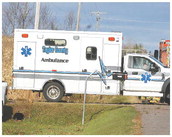Sticker shock
Wages drive ambulance subsidy to record highs


The annual subsidy request from Aspirus to cover the shortfall in the ambulance service drew the ire of some members of the county’s law enforcement committee on Monday morn...


The annual subsidy request from Aspirus to cover the shortfall in the ambulance service drew the ire of some members of the county’s law enforcement committee on Monday morn...